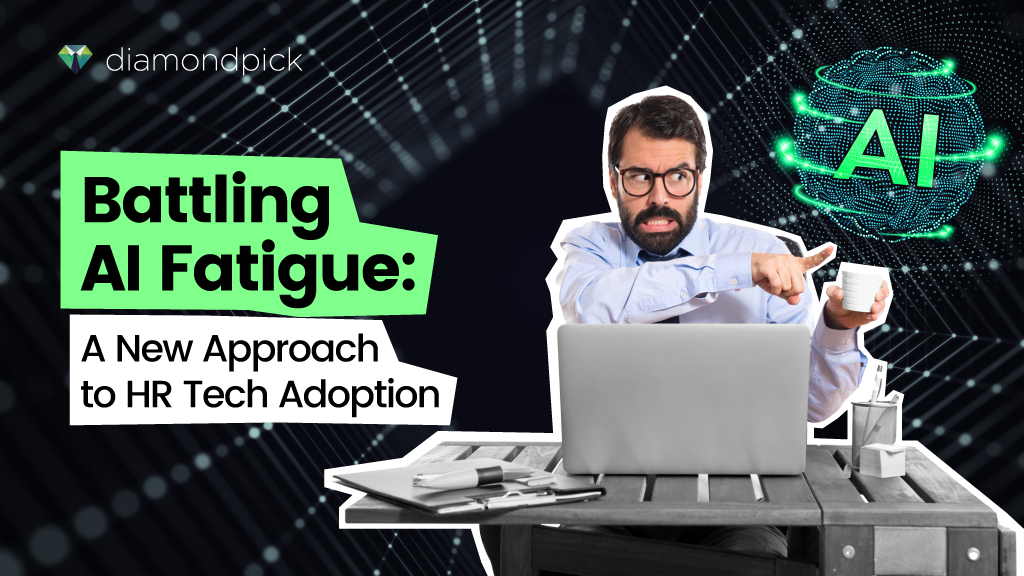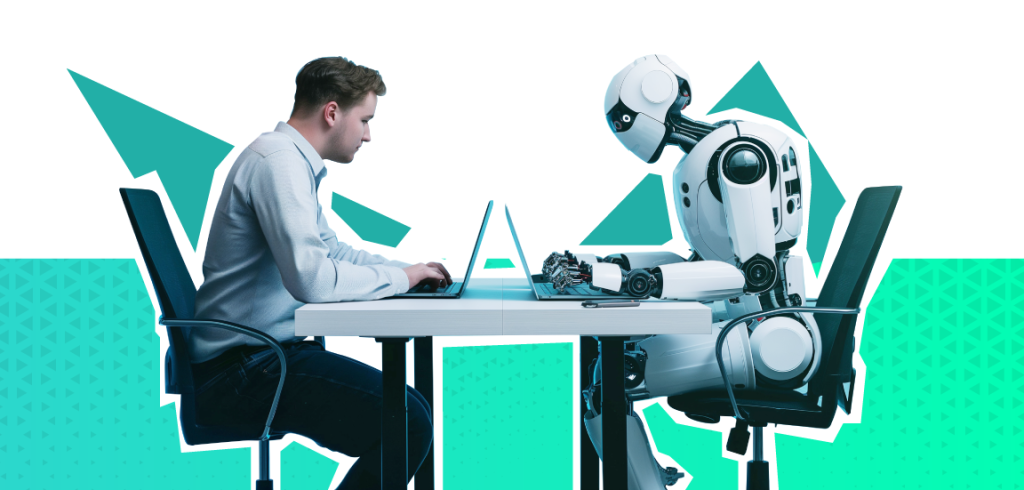
Battling AI Fatigue: A New Approach to HR Tech Adoption
By 2026, over 80% of enterprises will use GenAI APIs or applications, up from less than 5% in 2023, according to Gartner.
Generative AI (Gen AI) is rapidly transforming the recruitment landscape, revolutionizing how we source, assess, and engage with talent. From automating repetitive tasks to delivering data-driven insights, AI has become an indispensable tool for recruiters and hiring managers alike.
But with this rapid adoption comes a new challenge that’s quietly creeping into the industry – Gen AI Fatigue. Over-reliance on AI for many tasks, lack of human interaction when required, and outdated AI tools are causing frustration, disengagement, and resistance amongst recruiters. Addressing this ‘AI fatigue’ is crucial to maintaining recruitment effectiveness and ensuring that these powerful technologies enhance, rather than hinder, our hiring processes.
In this blog, we’ll explore what Gen AI fatigue is, why it matters, and how to strike the right balance between automation and the all-important human touch in recruitment.

What is Gen AI Fatigue?
Gen AI fatigue is the reluctance, hesitation, or reduced interest in exploring new Gen AI tools and a growing skepticism towards its transformative potential. This decline in adoption is largely due to overuse or over-reliance on AI tools, which leads to diminished effectiveness or resistance. It has the perception that AI is being used as a universal solution, disregarding the complexities and unique challenges of the real world. This isn’t about technology failing us—it’s about us, the people, feeling overwhelmed by it.
Some of the leading causes of Gen AI Fatigue:
- Information Overload: Too much AI in the news makes it hard to separate facts from hype.
- Lack of human touch, especially in tasks that require it, like candidate interactions.
- Complexity and Ambiguity: The rapid pace of AI evolution creates uncertainty and confusion.
- Over-automation of recruitment processes.
- Ethical Concerns: Bias, privacy, and job loss fears raise doubts about AI.
- Resistance to Change: Fear of job displacement and altered workflows slow AI adoption.
- Saturation of AI tools without adequate updates or improvements.
Some Signs of Gen AI Fatigue
Among Recruiters
- Decreased engagement with AI tools.
- Increased resistance to adopting new AI solutions.
- Fatigue from repetitive tasks and decision-making processes dominated by AI.
Among Candidates
- Frustration with impersonal or robotic interactions.
- Decreased enthusiasm for AI-driven application processes.
- Concerns over AI bias and lack of transparency in recruitment processes.

Strategies to Combat AI Fatigue
As AI and digital tools flood the workplace, many employees are growing weary, and if left unchecked, this fatigue could undermine even the most ambitious digital strategies. So, how can leaders tackle this issue and reinvigorate their teams?
- Acknowledge the Power of Gen AI: It’s important to know that AI is here to stay. It’s a powerful tool with immense potential. A shift in mindset is vital for digital transformation to flourish.
- Acknowledge the Power of Gen AI: It’s important to know that AI is here to stay. It’s a powerful tool with immense potential. A shift in mindset is vital for digital transformation to flourish.
- Prioritize Problems Over Technology: Many leaders jump to implement AI without clearly defining the problem it should solve. The result? Missed targets and wasted investments. A clear problem definition ensures that tech investments deliver tangible returns, reducing frustration and preventing fatigue.
- Adopt a Strategic Approach: With thousands of AI tools flooding the market, not everyone is a good fit. Leaders should carefully evaluate which tools align with their organizational goals to avoid overloading employees and wasting resources.
- Set Realistic Goals: Unrealistic expectations can set innovation up for failure. Achievable targets and expectations are necessary for success.
- Balancing Automation and Human Touch: While AI excels at processing data, it can’t replace human creativity, empathy, or critical thinking. The key to the future is combining AI’s efficiency with human expertise, creating a more balanced and comprehensive approach to problem-solving.
- AI Literacy: Training programs for recruiters on the effective use and management of AI tools.
Next Steps: Thriving in an AI-Driven World
Gen AI fatigue is real, but it doesn’t have to be a roadblock. With a thoughtful approach, a focus on human-centric values, and a commitment to ongoing learning, Gen AI can be a springboard for innovation.
Organizations can unlock Gen AI’s full potential by understanding the causes of Gen AI fatigue and implementing strategies to balance technology with human intuition. The goal isn’t just to keep up with AI advancements but to ensure they serve us effectively, making work more meaningful, efficient, and rewarding.
